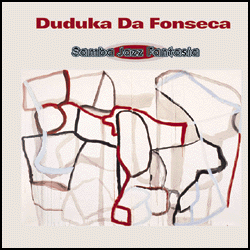Samba Jazz Fantasia
|
Samba Jazz Fantasia |
| Duduka Da Fonseca [Malandro Records MAL 71018] |
|
Jim Merod |
|
10 June 2002 |
Malandro Records, in Cincinnati, Ohio, has become one of the hippest places on the planet. If you doubt that attribution, work your way through their catalog of genuinely world-class Brazilian-inspired music with players who do not merely approach the spirit of Brazil’s musical heritage, but who embody that spirit from long years of front line playing.
 You might begin almost anywhere, no doubt, but the new Samba Jazz Fantasia album that brings percussionist-extraordinaire
You might begin almost anywhere, no doubt, but the new Samba Jazz Fantasia album that brings percussionist-extraordinaire
Duduka Da Fonseca to the fore — his first album as an outright “leader” (although you could consider any album that Duduka performs on to be his album) — features a who’s who of current jazz luminaries.
There is no exaggeration to say that the following participants of Samba Jazz Fantasiareside at the apex of the jazz universe: trumpeters Tom Harrell and Claudio Roditi; saxophonists David Sanchez and Joe Lovano; bassists Eddie Gomez and Dennis Irwin; guitarists John Scofield and Romero Lubambo; pianists Kenny Werner, Helio Alves and Alfredo Cardim … apparently Duduka and Malandro could not get the cats they really wanted.
And, believing that, I’ll point you to a rap album that deserves a Grammy Award. In fact, the juxtaposition of the first mild sarcasm with the second (stronger) sarcasm indicates just how hip Malandro Records truly is. Samba Jazz Fantasia puts the best musicians possible in a situation where the feeling of an open jazz session is merged with the appropriate control of a well-planned studio all-star session.
Punch in any track and let it carry you up and off. Track eleven, Jobim’s “Fotographia” is my favorite place to start. I’ve played this album almost constantly since it came within my eager grasp. While I cannot assert that the album owns a suite-like continuity or depth of interlaced compositional self-commentary
as does Chico O’Farrill’s final album, Carambola [Milestone MCD-9308-2], Samba Jazz Fantasia has something very much like the joyful self-reticulation that defined O’Farrill’s work over a half-century.
I begin this album (for myself) out of order, with “Fotographia,” because — after more than a dozen hearings — it initiates the essential brio that sets up this album’s identity: a swaying, relaxed human surge that seems to lift outstretched arms to a cloudless blue sky, as if in childlike celebration of morning’s surprise.
The “surprise” at work all across this magnificent album is that life can be intelligent and casual at once. Duduka Da Fonseca and his friends know what the inner pulse of the body’s happy energy lends the engaged mind when it is alert and fresh and musical. The “what” is the surplus that emerges when poetic intelligence is free to roam on its own. How extraordinary (and rare) that so much intelligence, as we find here, might reside on one disc … or anywhere at all in a culture that seems hell-bent on promoting non-musical distractions of many kinds, anything of easily calculated “worth” that excludes moments of indescribable value: beauty as clear as these songs and performances.
On one hand, it is impossible not to hear the collective exuberance of Duduka’s musical partnerships in the context of the loss of public ease and enthusiasm. On the other hand, it is equally difficult not to recognize how removed this music is from every itch toward ugliness and brutality. Samba Jazz Fantasia stands by itself on self-defined terms. It offers a sixty-nine minute seminar on lyrical sublimity.
Just about anyone can use such instruction now and then.
“Fotographia” is enchanting, in no small part because Duduka’s talented wife, vocalist Maucha Adnet sings sinuously across the song’s opening and closing bars… like a gloriously free dolphin exercising spectacularly controlled leaps and plunges.
“Maucha” is a joy to hear. Tom Harrell’s flugelhorn solo exhibits his characteristic burnished tonal warmth and liquid phrasing. Joe Lovano slips in and out of dark intervals that catch you up in their arch, sardonic puckishness… but then Lovano does that often and Harrell rides his generous big tone as only he can… and so this album, for me, reveals its inner secret most fully on this cut.
It is, of course, a very public secret: splashing in the surf of precisely liberated rhythms, perfectly torqued melodies, all the while moving from one challenging yet seemingly effortless lyric to another.
Consider the album’s opening track, “Partido Out.” Its odd-time signature (15/8) sets traditional samba energies ajar. The power established by the double percussion line skips along beneath Billy Drewes’ tenor sax and Jay Ashby’s extremely subtle trombone. On the out chorus, the rolling churn of it all leaps to a boil as if the seven musicians had cloned themselves into twice that many, Duduka scratching the cuica and Ashby dancing on top. A festive mood has been set.
Tom Harrell’s “Terrestris” — a darting peek-a-boo line that invites playfulness — follows with Lovano’s sax oozing Joe Henderson-like tonal color. When Harrell’s flugel comes in, the whole scene opens up like a kid’s playground filled with Peanuts comic strip characters cavorting happily.
This twelve-song ride is devoted to cheerful musicianship. Even when we drop to a gentle (somewhat meditative) cadence on track three, “Sco’s Samba,” a six-minute vehicle for John Scofield’s bemused lyric interiority, the spirit of romping ease still prevails.
“Bala com Bala,” Joao Bosco’s impish little line, gives us the gorgeous voicing of tenor saxophonist David Sanchez alongside Claudio Roditi’s trumpet. A better pairing one cannot imagine. Roditi, like Harrell, is in a class of his own. Both horn players express themselves with a deeply felt inventiveness that never accepts notes tossed off aimlessly. Both create a sound on their horns that offers immediate recognition. You know Claudio from his first breath, sonorous and graceful. Its vocal lift is slightly reminiscent (anomalously) of trumpet legend Clark Terry. The thing to listen for here is the way that Roditi’s sound and approach mates sympathetically with Sanchez’ bold, sometimes pleasantly gruff attack.
“Pedra Bonita” is a trio feature that brings Eddie Gomez’s bass surging to the front, just right, beneath Helio Alves’ piano. These nearly six-minutes exude a quiet yearning for things remote and framed by nostalgic calm.
Duduka’s “Dona Maria” pairs soprano saxophonist Billy Drewes with pianistic provocateur Kenny Werner. This quartet show- down is won in decisive fashion by everyone who gives himself up to the hell-bent release it achieves. Next, the hauntingly beautiful “Saveiros” features Maucha Adnet’s enticing voice skating on Kenny Werner’s complex and delicate lines . . . a habit of Werner’s that is at once a virtue and an unusual supplement for the many singers who are blessed by his taste, tact, and intelligence. For many listeners, this song may easily become the one that calls them back to hear this remarkable disc over and over.
The mad itch of the album’s keen self-awareness will be found in the album’s three- song conclusion. “Pro Flavio” sets Scofield’s dancing guitar loose next to Romero Lubambo’s burly energy on the latter’s tribute song for his father. A luxurious clatter, improbably exact, carries you across eight minutes of deep-in-the-pocket intensity . . . and plops you inside Jobim’s “Fotographia” only to take you off and out with post-bop Brazilian fancy on the final track, “Manhattan Style,” under the stalwart urging of Roditi and Sanchez.
There, in stunning fashion, you have completed serious travel from Brazil’s native legerdemain, rainbows bristling like splintered hope afire, all the way to where you are — at home, on the train with headphones insulating you from drivel ….
Brazil, the samba’s many forms and inflections, a vast and entrancing whiteness shimmering everywhere, solitary and luminous: your best self, these incredible musicians, childhood’s lost slumbering beast, calm within, nameless things without … are you at one with these unflustered landscapes, whole and glad inside the massive health this proud and selfless music here creates?
If not, go back to one or zero. Punch your music player where it says “go.” Wake yourself up. Listen to Duduka Da Fonseca’s friends and colleagues. This fantasia is meant for you.
![]()
Don’t forget to bookmark us! (CTRL-SHFT-D)
Stereo Times Masthead
Publisher/Founder
Clement Perry
Editor
Dave Thomas
Senior Editors
Frank Alles, Mike Girardi, Key Kim, Russell Lichter, Terry London, Moreno Mitchell, Paul Szabady, Bill Wells, Mike Wright, Stephen Yan, and Rob Dockery
Current Contributors
David Abramson, Tim Barrall, Dave Allison, Ron Cook, Lewis Dardick, Dan Secula, Don Shaulis, Greg Simmons, Eric Teh, Greg Voth, Richard Willie, Ed Van Winkle, and Rob Dockery
Music Reviewers:
Carlos Sanchez, John Jonczyk, John Sprung and Russell Lichter
Site Management Clement Perry
Ad Designer: Martin Perry





Be the first to comment on: Samba Jazz Fantasia